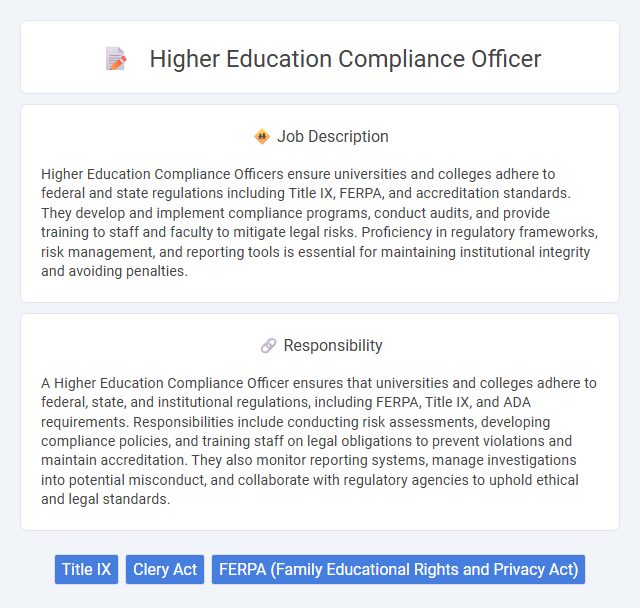
Higher Education Compliance Officers ensure universities and colleges adhere to federal and state regulations including Title IX, FERPA, and accreditation standards. They develop and implement compliance programs, conduct audits, and provide training to staff and faculty to mitigate legal risks. Proficiency in regulatory frameworks, risk management, and reporting tools is essential for maintaining institutional integrity and avoiding penalties.
Individuals with strong attention to detail and a deep understanding of regulatory requirements are likely to be well-suited for a Higher Education Compliance Officer role. Those who thrive in environments requiring ethical decision-making and excellent communication skills may find this position aligns with their strengths. Candidates who prefer structured tasks and enjoy navigating complex policies will probably experience greater job satisfaction and success in this field.
Qualification
A Higher Education Compliance Officer typically requires a bachelor's degree in law, education administration, or a related field, with many institutions preferring candidates with a master's degree or professional certification such as Certified Compliance & Ethics Professional (CCEP). Experience in regulatory compliance, risk management, or audit within the education sector is essential to navigate complex federal and state educational regulations. Strong knowledge of accreditation standards, FERPA, Title IX, and other relevant laws is critical for ensuring institutional adherence and mitigating legal risks.
Responsibility
A Higher Education Compliance Officer ensures that universities and colleges adhere to federal, state, and institutional regulations, including FERPA, Title IX, and ADA requirements. Responsibilities include conducting risk assessments, developing compliance policies, and training staff on legal obligations to prevent violations and maintain accreditation. They also monitor reporting systems, manage investigations into potential misconduct, and collaborate with regulatory agencies to uphold ethical and legal standards.
Benefit
Higher Education Compliance Officers likely benefit from ensuring that institutions adhere to regulatory standards, reducing the risk of legal penalties and financial losses. They probably play a key role in fostering a culture of accountability and ethical behavior, which could enhance the institution's reputation. Their expertise may lead to improved policy implementation and streamlined compliance processes, potentially increasing operational efficiency.
Challenge
The role of a Higher Education Compliance Officer probably involves navigating complex regulatory environments that frequently change, demanding constant vigilance and adaptability. Ensuring institutional adherence to diverse federal, state, and accreditation standards may create persistent challenges in managing risk and maintaining ethical practices. Balancing compliance requirements with academic freedom and operational goals might be a significant difficulty faced daily.
Career Advancement
Higher Education Compliance Officers play a critical role in ensuring institutions adhere to federal, state, and accreditation regulations, promoting legal and ethical standards across academic programs. Career advancement typically involves gaining expertise in regulatory frameworks, risk management, and institutional policies, leading to senior roles such as Compliance Director or Chief Compliance Officer. Continuous professional development, certifications like Certified Compliance and Ethics Professional (CCEP), and building strong relationships with administrative leaders significantly enhance upward mobility in this field.
Key Terms
Title IX
Higher Education Compliance Officers specializing in Title IX ensure institutional adherence to federal regulations preventing sex-based discrimination and harassment. Their responsibilities include conducting investigations, developing training programs, and managing reporting processes to maintain a safe and equitable campus environment. Expertise in Title IX policy implementation and regulatory updates is critical for mitigating legal risks and fostering institutional accountability.
Clery Act
Higher Education Compliance Officers specialize in ensuring institutions adhere to federal regulations, with a critical emphasis on the Clery Act, which mandates transparency in campus crime reporting. They oversee the accurate collection and dissemination of campus safety data, maintain compliance with timely warnings and annual security reports, and collaborate with law enforcement agencies to protect students and staff. Expertise in Title IX coordination and risk management complements their role in upholding legal standards and promoting a safe educational environment.
FERPA (Family Educational Rights and Privacy Act)
Higher Education Compliance Officers ensure institutional adherence to FERPA regulations by protecting student education records and maintaining privacy standards. They develop policies, conduct training, and manage audits to prevent unauthorized disclosure of personally identifiable information. Maintaining compliance with FERPA safeguards student rights and mitigates legal risks for educational institutions.
 kuljobs.com
kuljobs.com